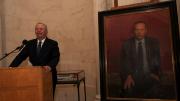Last Friday afternoon, September 23, the official portrait of Lawrence H. Summers was unveiled during a celebratory tribute in the Widener Library rotunda, 16-plus years after his departure from Massachusetts Hall. (This and future presidential portraits will apparently hang in Widener, rather than in the Faculty of Arts and Sciences’ Faculty Room, atop University Hall.) The speakers both poked fun at Harvard’s twenty-seventh president, from 2001 to 2006, and highlighted his signal impacts on the institution.
The large portrait—more than five feet high, framed—was painted by Steven Polson, who specializes in notable leaders. His website lists commissions for Colin Powell, LL.D. ’93, Madeleine Albright, LL.D. ’97, and Condoleezza Rice. He has also portrayed Robert E. Rubin ’60, LL.D. ’01—a longtime Summers mentor, friend, and Corporation member during his presidency, who spoke Friday—and the occasional academic leader, such as Brown president emerita Ruth J. Simmons, Ph.D. ’73, LL.D. ’02. Perhaps because of that focus on people who have wielded power, Polson’s portrait of Summers, in the subject’s words, “conveys a certain youthful intensity,” against a blank crimson backdrop: possibly emblematic of the community the president set out, and hoped, to change.
In two ways, the ceremony was reminiscent of the last arrival of a presidential portrait, of Neil L. Rudenstine (the University’s leader from 1991 to 2001), on May 1, 2006—two months before the end of the Summers administration.
First, each leader broke with tradition, choosing a depiction of himself donned in something other than the Harvard president’s distinctive black academic gown. Rudenstine, Ph.D. ’64, a scholar of poetry and a devoted reader, appears in his crimson doctoral gown, book in hand. Summers, Ph.D. ’82, an economist who devours and delights in data, and who as a former Secretary of the U.S. Treasury has often been in the corridors of government and corporate power worldwide, chose to be shown in business attire, an iPad in hand.
Second, each portrait was presented during a transition in the Harvard presidency. At the time of the 2006 event, Summers had already announced his resignation, and was preparing for his final Commencement address and his new role, as Eliot University Professor. Rudenstine, Summers, and Derek Bok, who had been tapped to return to Mass Hall as interim president, all attended. Now, having announced his plans this past June, President Lawrence S. Bacow is in his final year of service, with the search for his successor well under way.
Two Presidents, Two Treasury Secretaries
In their different ways, the speakers all addressed some of the enduring changes begun during the Summers presidency—a period he has himself characterized as “not without substantial turbulence.” Those notable changes include a widely emulated approach toward financial aid for undergraduates from low-income families; Harvard’s accelerating commitment to research and teaching in the sciences; a focus on students; and, personally most important, a lasting change in Summers’s family life.
Bacow led the roster of speakers at the Widener event, introducing himself as “the other president named Larry” and recognizing the artist. He noted that he and Summers had both been economics undergraduates at MIT—Bacow a few years ahead of Summers, whom he didn’t know then, but whom everybody knew about. Similarly, they were both graduate students at Harvard’s Littauer Center; faculty members at MIT; and then, remarkably, assumed Red Line university presidencies on the same day, July 1, 2001, at Tufts and Harvard, respectively.
Bacow recalled that Summers invited him to visit on that first day, where they discussed common challenges they faced. In their responses, he joked, “We didn’t get any of them right.” But a 21-year high-level academic acquaintanceship was launched. “Larry is somebody who loves a good argument,” Bacow said of Summers, to laughter, and who “holds his opinions firmly, and expresses them strongly”—an articulate leader, and a great extemporaneous speaker. And then he got to the heart of the matter: “Larry actually will change his mind in face of a better argument or new information,” Bacow said—a quality all too scarce in current discourse. (This is of a piece with Bacow’s theme of encouraging members of the Harvard community to listen generously and to support open airing of intellectual differences—very much including a willingness to change one’s mind, the better to promote understanding; see his Convocation and Morning Prayers remarks at the beginning of this semester.)
Bacow lauded Summers’s “brilliant scholarship,” distinguished public service, and Harvard accomplishments, including:
•reimagining aid to make higher education more accessible to low-income students (the Harvard Financial Aid Initiative, eliminating tuition and fees for students from families with incomes, today, of less than $75,000), a step that “forced a lot of higher-education institutions to think about how they did financial aid”;
•“exquisite taste” in hiring promising faculty talent, bringing “superb” scholars to the University and, through the Faculty of Arts and Sciences’ (FAS) adoption of a tenure track, enabling the institution to attract and retain “really promising younger scholars,” which had not always been a strength; and
•being “much beloved by his students” and recognized as a “great teacher” who mentored generations of students—“a shining example for all of us to emulate” in a place where not everyone takes such interest in students.
After an ovation for Summers, Bacow said that as president, his predecessor Larry had been “generous with his advice and guidance, some of which I’ve even solicited.” Though they have not always agreed, Bacow continued, robust engagement with those different points of view had sharpened his thinking.
“It’s a privilege to be yet another Larry who holds the same title,” Bacow concluded, “and I want to thank you for everything you’ve done for this place.” He then noted that in addition to two presidential Larrys, the room hosted two former U.S. Treasury Secretaries, and gave the floor to Robert Rubin.
As the person present who had known Summers the longest, some 40 years, Rubin joked, he could have been scheduled last, to rebut the encomiums bestowed during the gathering. He recalled that former U.S. Secretary of State Henry A. Kissinger ’50, Ph.D. ’54, L ’55, described Summers as “the best listener I’ve ever encountered.” Rubin countered to the effect that Summers could be “aggressive” in conversation, to which, he said, Kissinger responded, in effect, exactly: that’s how conversations result in better conclusions.
That characteristic, Rubin continued, was central to Summers’s presidential service. When he served on the Corporation as it discussed financial aid, tenure, science, and undergraduate life in those years, Rubin said, “You could feel it…. It was a paradigm change” for the University. As a public leader before and after his Mass Hall service, Rubin said, “he’s brought the strengths of Harvard”—analytical rigor, integrity—to policymaking. He cited the assessment of Richard Haass, president of the Council on Foreign Relations, that Summers was “the iconic example of what a public intellectual should be.”
When he concluded, Bacow pulled the cord to unveil the portrait, unleashing a chorus of camera shutters and expressions of admiration from the audience.
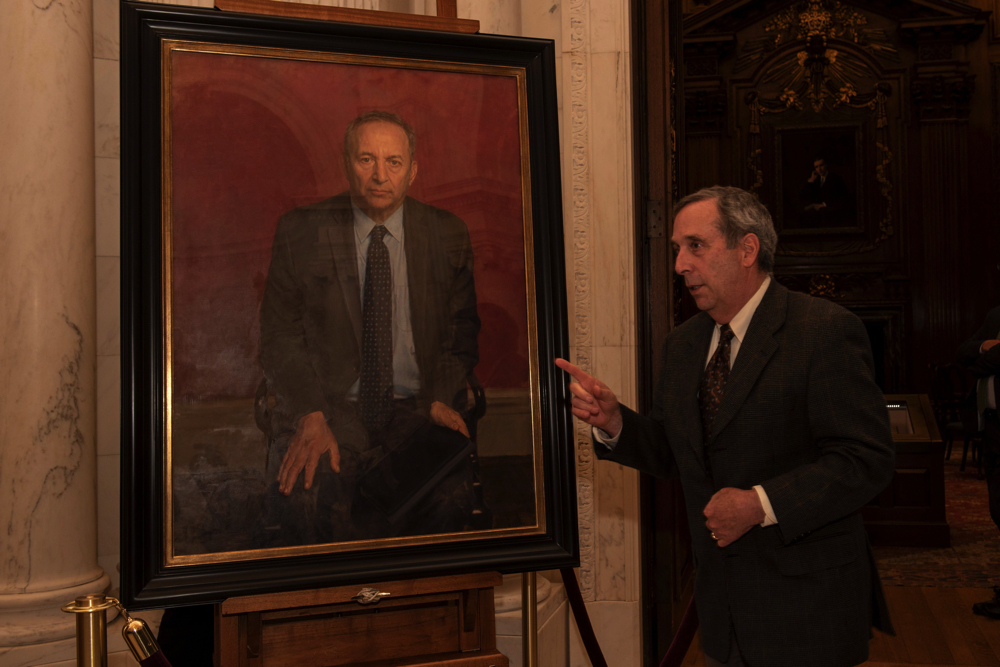
Harvard President Lawrence S. Bacow unveiling the portrait of predecessor Lawrence H. Summers
Photograph by Stu Rosner
The Harvard Impact
The next speakers emphasized aspects of Larry Summers’s presidential impact, focusing particularly on investments in science, financial aid, and his rapport with students—accompanied by a couple of interesting decanal comments on his administrative style. And then, before the subject himself spoke about his painted likeness, there was that personal matter to celebrate.
•George Q. Daley, now Harvard Medical School dean, began by saying, “I deeply respect and admire Larry Summers.” Admitting that his subject provided was not among the “buttoned-down, restrained, self-effacing” types who gave colleagues a “warm, touchy-feely” sensation, Daley pivoted to the former president’s “assertive” and “strategic” manner. As an example, he recounted a dinner at Elmwood, the president’s residence, where Summers, skeptical, questioned Daley and other faculty members about Harvard’s approach to stem-cell science. As they explained the field, he said, the president “probed for deeper reflection and debate”—and gradually, “the initial skepticism turned to advocacy,” and the Harvard Stem Cell Institute was conceived. It was, Daley continued, “one of the richest intellectual experiences of my academic career.”
Scroll forward to 2017, and Daley, newly named dean, found himself leading a school that had run deficits for a decade. A physician scientist who had never, he said, taken so much as Economics 10, he was guided to seek out Summers for help. What followed was a tutorial on financial management, from which emerged a fiscal strategy to stabilize HMS’s operations, Daley said—the operating foundation that gave Len Blavatnik, M.B.A. ’89, sufficient confidence to make the $200-million gift that has put the entire school on a sounder footing.
Recalling Summers’s championing of the life sciences and HMS, Daley said, it was fitting that his portrait would hang in Widener, where it will be visible to future generations of students. Its subject, he concluded, was “an earnest and passionate advocate for the core values of this institution,” including the “moral responsibility” of such institutions “to make their work relevant.”
•Douglas Melton, who took the baton from Daley, spoke from the faculty perspective—and from the vantage point of someone who is very committed to making his work relevant. Melton called Summers an “exciting” president, “a true visionary who said, ‘How do we do better?’” In discussing stem-cell science with Summers early in his administration, Melton said the president asked questions “like a really good undergraduate”—by which he meant, admiringly, fundamental queries posed without inhibition—and then, made a decision: that a major commitment to the field “is exactly the kind of thing Harvard should do.” The resulting institute, which Melton co-founded and -led, is now the number one place in the world to do such research, he noted, drawing on the hospitals, medical school, and FAS. And it has spawned some 38 biotech companies (that impact on the world)—including, he noted, those that deployed mRNA vaccines against the coronavirus.
Melton did not say so, but his own company, and personal decisions, reflect that same pursuit of impact. The Xander University Professor, and former faculty dean of Eliot House, has taken an extended leave to work as a distinguished fellow at Vertex Pharmaceuticals, aiming to accelerate therapeutic deployment of his lab’s stem-cell-based approach to treating diabetes.
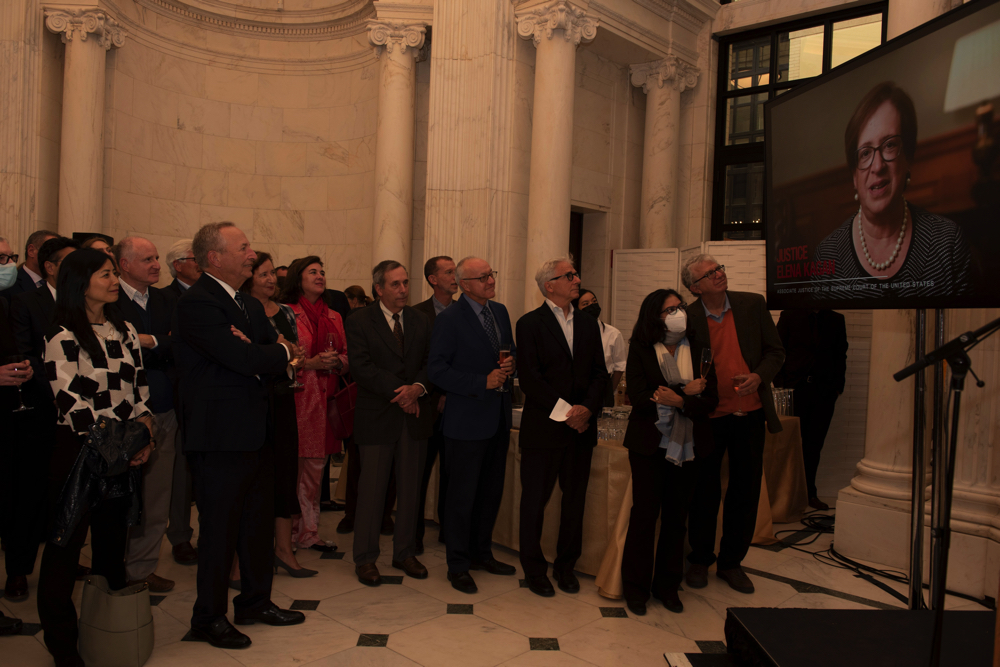
Elena Kagan, appearing by video
Photograph by Stu Rosner
•Elena Kagan, now Associate Justice of the Supreme Court, appearing by video, recalled her service at Harvard Law School, where “I loved deaning for you” (beginning in 2003, continuing through early 2009). No conversational shrinking violet herself, Kagan said she “learned something from you every time we talked. You made me smarter,” always offering “assessments of probabilities” and refusing to “settle for easy answers.” The result, she said, was better decisions, and a better school.
•William Fitzsimmons, the College’s dean of admissions and financial aid, also on video, lauded Summer’s “pioneering efforts” to open Harvard “to students from all economic backgrounds.” A first-generation student himself, Fitzsimmons said the aid initiative had “changed countless numbers of lives and will in the future, in perpetuity. I couldn’t be more grateful”—a sentiment shared, he said, by the students and their families. (Doing so has, incidentally, set off an arms race among the well-endowed, highly selective universities and colleges; Princeton, the best-endowed school per student, recently raised its free-attendance family income threshold to $100,000—a level that will force FAS to sharpen its appeals for scholarship endowment funds to keep pace.)
•Eric Lander, professor of systems biology (on leave), founding director of the Broad Institute of MIT and Harvard, the genomics research center founded in 2003, and the final video speaker, imagined the kind of Summers portrait he would paint if he were artistic: a background of Athens or Florence, consistent with the president’s view of Cambridge as the center of a twenty-first-century life-sciences renaissance; a science lab, representing Summers’s “rigorous mind of a scientist”; a “blurred” image of the man himself, conveying him in constant motion; and “in the foreground, there would be hordes of young people cheering” his energy and exciting vision. “You shaped this community and the world in ways beyond what you will ever know,” Lander concluded.
•Lauren Schuker Blum ’06, who covered Summers as a Crimson writer and then president of the newspaper in 2005 (“an exciting time on campus” for both Summers and the media reporting on him), spoke from the student perspective—after first humorously apologizing for stalking him and cold-calling his mother for journalistic purposes. The former president’s habit of debating everything (down to the details of what it would cost to satisfy a plea to extend dining hall hours) was “one of the things that made him so beloved” by students, she said. Those engagements were “thrilling,” she continued, even if the habit was “less thrilling to some tenured members of the faculty.” She cited his maxim that “a university should be governed by the authority of ideas and not the idea of authority,” and his adherence to it throughout his administration. In advancing science, financial aid, and the University’s global reach, she said, “Larry made Harvard feel like the center of the world.”
And then, in a surprising pivot, she said, “One more thing emerged from that era—a love story,” making way for her own beloved teacher, Cabot professor of American literature Elisa New.
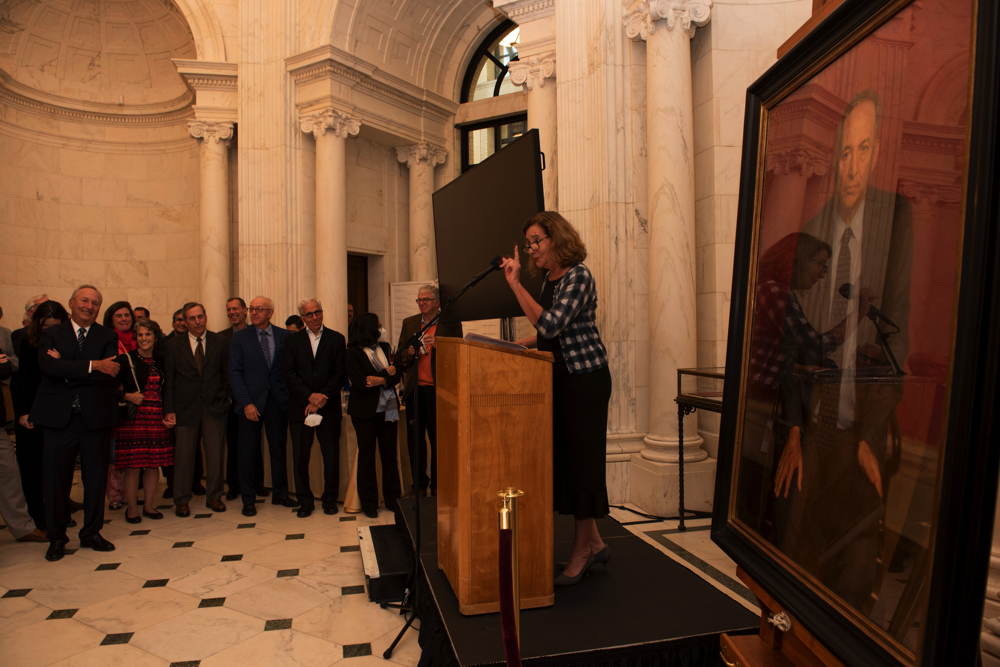
Elisa New
Photograph by Stu Rosner
•Elisa New recalled meeting Larry Summers the week after 9/11. After some friends had suggested she get in touch, she called his office to do so and, she related (to much laughter, given the president’s troubles with remaining on schedule), he didn’t get back for 10 days. He asked what she thought he should say at Memorial Church during a ceremony following the World Trade Center attack. New suggested a focus on the people of New York and ventured a poem he might use; in her telling, he was all about the global and U.S. implications of the attack, and Harvard’s role in responding to grave new challenges.
It was a perfect illustration, she said, of “how different we were, in exciting ways,” and of her future husband’s “future-oriented” mindset and macroeconomic perspective, always bent on “seeing around corners, weighing probabilities,” and articulating what is coming, like it or not. From that early moment in his presidency, she said, Summers saw that “universities were going to be more important in the world,” and the elite ones still more so—facing ever-greater demands “to answer more to the world,” rather than to their own privileges.
Throughout his presidency, she said—as the financial-aid initiative took shape, the Broad Institute gained momentum and scale, and the campus expanded—“What really animated Larry was Harvard as a hub of human progress.” Walking across the campus one evening, after the day’s formal business was done, she said, he was touched by the lights ablaze: “For him, what those lights meant was the pursuit of big ideas by big and hungry minds.”
After Summers left Harvard for service in the Obama administration, New concluded, he came back to campus, because “Harvard is his home.”
The Former President’s Perspective
At the lectern at last, Summers said, “This is all a bit overwhelming.” Citing his five presidential years as the most vital of his life, he continued, “Meeting Lisa” was the best thing.
Steven Polson’s portrait, he said, “captures a sense of intensity and even restlessness,” to its subject’s pleasure, and he was “flattered that the people who spoke today in various ways commented on it.” His “intensity and restlessness as Harvard’s president came from a really strong connection” that began when he was a 19-year-old research assistant to Martin Feldstein (the late Baker professor of economics and longtime president of the National Bureau of Economic Research). He aspired for thousands of students to share that sense of excitement, because the “sparks lit here” could lead them to live fulfilling lives, creating ideas that would have a profound impact on the world.
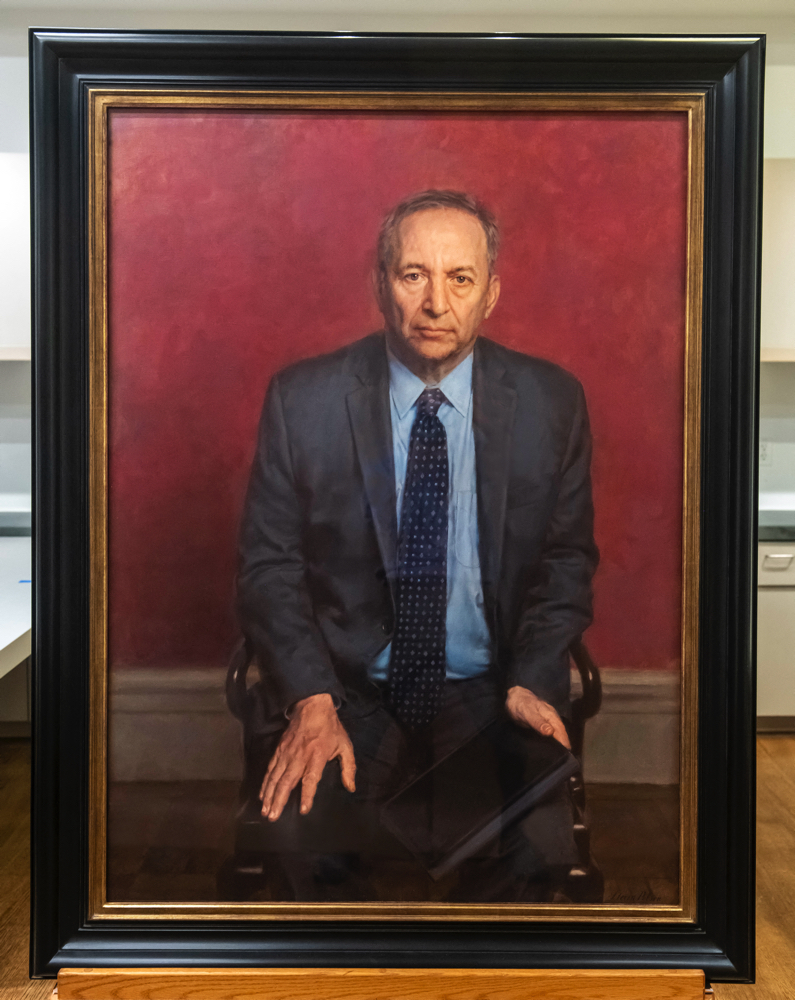
Official portrait of Lawrence H. Summers
Photograph by Jon Chase, courtesy of Harvard Public Affairs and Communication
In that familiar, stentorian voice, Summers continued, “I was a man in a hurry” to make a better world, from researching cures to cancer and ways to make society fairer, to preparing for pandemics. Doing so, he said, meant “empowering the young” and “trying to do new things in new ways”—and that “unrenewed tradition” was a route toward “stagnation.” Thus, “No idea was beyond question in pursuit of Veritas.” If that process led to friction, it was intended to generate intellectual sparks.
“Perhaps I overdid the friction sometimes,” Summers conceded, acknowledging that he would do some things differently today. But he was always animated, he said, by the “deep belief in the transcendent importance of what we do here.” The pursuit of truth, he said, was “never more important than today.”
It would be for others to judge his legacy, Summers concluded, but he was “grateful to have led the community, to spend my professional life in it, and to have my likeness on these walls forever.”
As a succinct first draft of that legacy, it would be hard to come up with a better formulation: friction and sparks—together.
